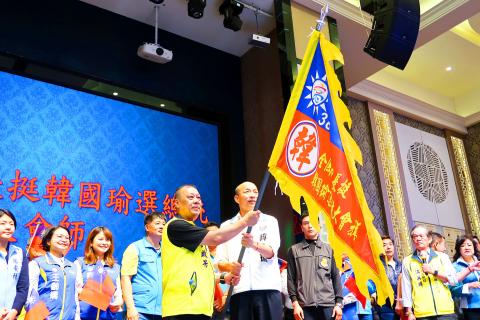Kaohsiung Mayor Han Kuo-yu (韓國瑜) yesterday urged supporters to give the Chinese Nationalist Party (KMT) another chance in the Jan. 11 presidential and legislative elections and vowed to reform the party if elected president.
The KMT was voted out of office in 2016 because it had lost touch with the public and had deviated from their will, the KMT presidential candidate told a rally attended by more than 1,000 township mayors and borough wardens in Kaohsiung’s Daliao District (大寮).
The Democratic Progressive Party (DPP) is repeating mistakes the KMT made before its 2016 election defeat, and as ruling parties, both put little effort into running the nation, Han said.

Photo: CNA
Having achieved little regarding their policies, both parties therefore resorted to mudslinging and squandering money to win elections, he added.
“If elected president, I promise that I will work hard, that the KMT will undergo reforms and that we will cultivate younger generations,” he said, urging supporters to give the KMT another chance.
Han also promised to offer township mayors a fixed salary or a raise in their monthly allowance.
The current policy of paying each township mayor a monthly allowance of NT$45,000 is unreasonable, considering that the population of each township varies greatly, he said.
If elected president, he would conduct a nationwide survey among township mayors to determine how to adjust their pay, he said.
The rally was one of five campaign events Han attended in Kaohsiung yesterday. After the rally, he visited the Huangpu New Village (黃埔新村) veterans’ community in Fongshan District (鳳山), took part in skeet shooting in Daliao, and attended a Christmas celebration in Zuoying District (左營) and an event to promote local produce in Dashe District (大社).
At the shooting range, Han shot three green balloons respectively labeled “state apparatus,” “diplomatic isolation” and “1450” — a term coined by critics of the DPP to refer to what they believed to be the party’s online influence campaigns.
During an interview with reporters at the range afterward, Han accused the DPP of becoming arrogant after assuming power.
“The DPP’s remarks in the past several days show it has grown very arrogant since taking power,” he said.
Commenting on Deputy Minister of the Interior Chen Tsung-yen’s (陳宗彥) remarks on Saturday urging supporters not to vote for minor parties, Han said that members of the public could freely decide which party to vote for.
Democracy is valuable because of its diversity, he said, adding: “They think all Taiwanese have to vote for the DPP.”
In a video the DPP released on Thursday, DPP Legislator Kuan Bi-ling (管碧玲) even said that many Kaohsiung residents feel bad about what they did to Taiwan, Han said.
“In a democracy, people vote to choose their president, legislators and government heads. What wrong could Kaohsiung residents have done to the nation by electing a mayor?” he asked.
“I hope all 23 million Taiwanese vote to prove that the people are truly the master of the country,” he said.

INVESTIGATION: The case is the latest instance of a DPP figure being implicated in an espionage network accused of allegedly leaking information to Chinese intelligence Democratic Progressive Party (DPP) member Ho Jen-chieh (何仁傑) was detained and held incommunicado yesterday on suspicion of spying for China during his tenure as assistant to then-minister of foreign affairs Joseph Wu (吳釗燮). The Taipei District Prosecutors’ Office said Ho was implicated during its investigation into alleged spying activities by former Presidential Office consultant Wu Shang-yu (吳尚雨). Prosecutors said there is reason to believe Ho breached the National Security Act (國家安全法) by leaking classified Ministry of Foreign Affairs information to Chinese intelligence. Following interrogation, prosecutors petitioned the Taipei District Court to detain Ho, citing concerns over potential collusion or tampering of evidence. The

NEGOTIATIONS: Taiwan has good relations with Washington and the outlook for the negotiations looks promising, Minister of Economic Affairs J.W. Kuo said Taiwan’s GDP growth this year is expected to decrease by 0.43 to 1.61 percentage points due to the effects of US tariffs, National Development Council (NDC) Minister Paul Liu (劉鏡清) said at a meeting of the legislature’s Economics Committee in Taipei yesterday, citing a preliminary estimate by a private research institution. Taiwan’s economy would be significantly affected by the 32 percent “reciprocal” tariffs slapped by the US, which took effect yesterday, Liu said, adding that GDP growth could fall below 3 percent and potentially even dip below 2 percent to 1.53 percent this year. The council has commissioned another institution

NEGOTIATIONS: The US response to the countermeasures and plans Taiwan presented has been positive, including boosting procurement and investment, the president said Taiwan is included in the first group for trade negotiations with the US, President William Lai (賴清德) said yesterday, as he seeks to shield Taiwanese exporters from a 32 percent tariff. In Washington, US Trade Representative Jamieson Greer said in an interview on Fox News on Thursday that he would speak to his Taiwanese and Israeli counterparts yesterday about tariffs after holding a long discussion with the Vietnamese earlier. US President Donald Trump on Wednesday postponed punishing levies on multiple trade partners, including Taiwan, for three months after trillions of US dollars were wiped off global markets. He has maintained a 10 percent

TRADE: The premier pledged safeguards on ‘Made in Taiwan’ labeling, anti-dumping measures and stricter export controls to strengthen its position in trade talks Products labeled “made in Taiwan” must be genuinely made in Taiwan, Premier Cho Jung-tai (卓榮泰) said yesterday, vowing to enforce strict safeguards against “origin laundering” and initiate anti-dumping investigations to prevent China dumping its products in Taiwan. Cho made the remarks in a discussion session with representatives from industries in Kaohsiung. In response to the US government’s recent announcement of “reciprocal” tariffs on its trading partners, President William Lai (賴清德) and Cho last week began a series of consultations with industry leaders nationwide to gather feedback and address concerns. Taiwanese and US officials held a videoconference on Friday evening to discuss the